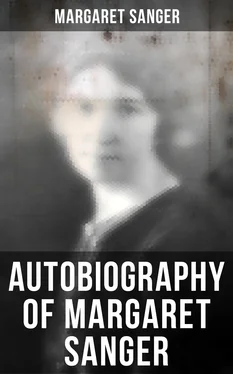How were mothers to be saved? I went through many revolving doors, looked around, and, not finding what I was seeking, came out again. I talked incessantly to everybody who seemed to have social welfare at heart. Progressive women whom I consulted were thoroughly discouraging. “Wait until we get the vote. Then we’ll take care of that,” they assured me. I tried the Socialists. Here, there, and everywhere the reply came, “Wait until women have more education. Wait until we secure equal distribution of wealth.” Wait for this and wait for that. Wait! Wait! Wait!
Having no idea how powerful were the laws which laid a blanket of ignorance over the medical profession as well as the laity, I asked various doctors of my acquaintance, “Why aren’t physicians doing something?”
“The people you’re worrying about wouldn’t use contraception if they had it; they breed like rabbits. And, besides, there’s a law against it.”
“Information does exist, doesn’t it?”
“Perhaps, but I doubt whether you can find it. Even if you do, you can’t pass it on. Comstock’ll get you if you don’t watch out.”
In order to ascertain something about this subject which was so mysterious and so unaccountably forbidden, I spent almost a year in the libraries—the Astor, the Lenox, the Academy of Medicine, the Library of Congress, and dozens of others. Hoping that psychological treatises might inform me, I read Auguste Forel and Iwan Block. At one gulp I swallowed Havelock Ellis’ Psychology of Sex, and had psychic indigestion for months thereafter. I was not shocked, but this mountainous array of abnormalities made me spiritually ill. So many volumes were devoted to the exceptional, and so few to the maladjustments of normal married people, which were infinitely more numerous and urgent.
I read translations from the German in which women were advised to have more children because it could be proved statistically that their condition was improved by childbearing. The only article on the question I could discover in American literature was in the Atlantic Monthly by Edward Alsworth Ross of the University of Wisconsin, who brought to the attention of his readers the decline of the birth rate among the upper and educated classes and the increase among the unfit, the consequences of which were sure to be race suicide.
The Englishman, Thomas Robert Malthus, remained little more than a name to me, something like Plato or Henry George. Father had talked about him, but he meant mostly agriculture—wheat and food supplies in the national sense. Possibly he had a philosophy but not, to me, a live one. He had been put away on a shelf and, in my mind, had nothing to do with the everyday human problem. I was not looking for theories. What I desired was merely a simple method of contraception for the poor.
The pursuit of my quest took me away from home a good deal. The children used to come in after school and at once hunt for me. “Where’s mother?” was the usual question. If they found me at my mending basket they all leaped about for joy, took hands and danced, shouting, “Mother’s home, mother’s home, mother’s sewing.” Sewing seemed to imply a measure of permanence.
I, too, wanted to drive away the foreboding barrier of separation by closer contact with them. I wanted to have them solely to myself, to feed, to bathe, to clothe them myself. I had heard of the clean, wind-swept Cape Cod dunes, which appeared to be as far from the ugliness of civilization as I could get. Socialism, anarchism, syndicalism, progressivism—I was tired of them all. At the end of the spring, thoroughly depressed and dissatisfied, I tucked the children under my arms, boarded a Fall River boat, and sailed off, a pioneer to Provincetown.
In 1913 the tip of the Cape was nothing but a fishing village with one planked walk which, I was told, had been paid for by Congress. Up and down its length the bellman, the last of the town criers, walked, proclaiming the news.
At first we lived in the upper story of a fisherman’s house right on the water. After he went out in the morning, his wife and her children, and I and mine, were left alone. Then the old women recalled scenes from their early days on the whaling vessels. Their mothers had brought them forth unaided, and their own sons, in turn, had been born on the ships and apprenticed to their husbands. They fitted into life simply, but the younger Portuguese, who were taking over the fishing industry, were asking what they should do about limiting their families.
The village was rather messy and smelled of fish. I was still too close to humanity and wanted to be more alone, so we moved to the extreme end of town. Our veranda faced the Bay, and when the tide was high the water came up and lapped at the piles on which the cottage was built. Stuart, Grant, and Peggy used to sit on the steps and dabble their toes. At low tide they had two miles of beach on which to skip and run; it was a wonderful place to play, and all summer we had sunrise breakfasts, sunset picnics.
Ethel, who had married Jack Byrne, was now widowed and had also gone into nursing. She had considerable free time and stayed with me. Consequently, I was able to leave the children in her care when I made my expeditions to Boston’s far-famed public library, taking the Dorothy Bradford at noon, and coming back the next day. Even there I found no information more reliable than that exchanged by back-fence gossips in any small town.
I spent the entire season at Provincetown, groping for knowledge, classifying all my past activities in their proper categories, weighing the pros and cons of what good there was in them and also what they lacked. It was a period of gestation. Just as you give birth to a child, so you can give birth to an idea.
Between interims of brooding and playing with the children I took part in the diversions of the minute colony of congenial people. Charles Hawthorne had a school of painting, and Mary Heaton Vorse with her husband, Joseph O’Brien, were there; so also were Hutch Hapgood and Neith Boyce. Jessie Ashley had lifted Big Bill Haywood out of the slough of the Paterson strike and brought him down to rest and recuperate.
Big Bill was one of the few who saw what I was aiming at, although fearful that my future might involve the happiness of my children. Even he did not feel that the small-family question was significant enough to be injected into the labor platform. Nevertheless, as we rambled up and down the beach he came to my aid with that cheering encouragement of which I was so sorely in need. He never wasted words in advising me to “wait.” Instead, he suggested that I go to France and see for myself the conditions resulting from generations of family limitation in that country. This struck me as a splendid idea, because it would also give Bill Sanger a chance to paint instead of continuing to build suburban houses.
The trip to Europe seemed so urgent that no matter what sacrifices had to be made, we decided to make them when we came to them. In the fall we sold the house at Hastings, gave away some of our furniture and put the rest in storage. Although we did not realize it at the time, our gestures indicated a clean sweep of the past.
Anita Block proposed that we go via Scotland; she wanted me to write three or four articles on what twenty-five years of municipal ownership in Glasgow had done for women and children. Socialists were talking about how everything there belonged to the people themselves and had earned their own way—banks, schools, homes, parks, markets, art galleries, museums, laundries, bath houses, hospitals, and tramways. The city was about to pay off the last debt on the transportation system, and this was being hailed as a great victory, a perfect example of what Socialism could do. It sounded big and fine, and I, too, was impressed. Certainly in Glasgow, I thought, I should find women walking hand in hand with men, and children free and happy.
Читать дальше












